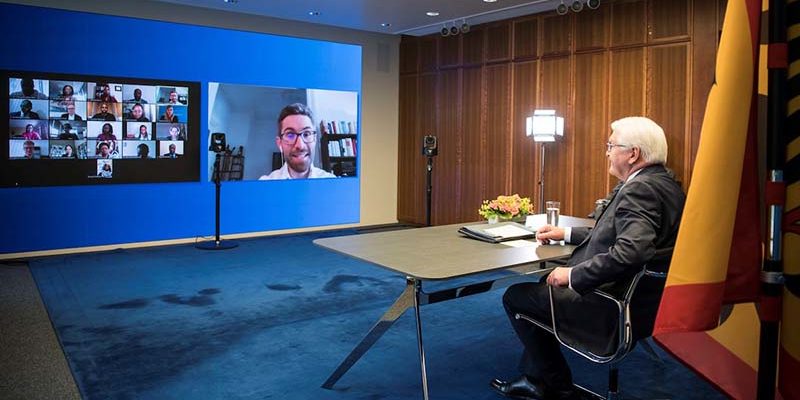
New solutions for an ethical digitalisation: International experts discuss their research findings with German Federal President Steinmeier
On February 7, 2022, Federal President Frank-Walter Steinmeier will receive the results report of the research project “The Ethics of Digitalization – From Principles to Practices” in Schloss Bellevue. The report shows why the digitalisation of almost all areas of life must be made fairer in a global context and how people can be empowered to assert their rights online. Please follow the event including a panel discussion and a Q&A session via livestream.
Under the patronage of German President Steinmeier and with support of the Stiftung Mercator, a global network of research institutes has demonstrated over the course of the past two years how the digital transformation can be managed according to ethical standards. International experts from science, business and civil society have developed groundbreaking answers to the following questions: How can discrimination by algorithms be avoided? How can online education be made accessible to all? How can digital sovereignty be achieved in times of powerful platform companies? The individual science formats were coordinated by the Alexander von Humboldt Institute for Internet and Society (HIIG) and carried out with other partner institutions of the Global Network of Internet and Society Research Centers (NoC).
“To actually move from principles to concrete practices, you need special formats in which interdisciplinary and intercultural collaboration can take place,” states Wolfgang Schulz, research director at HIIG. According to him, international cooperation, not national solo efforts, is the key. Matthias C. Kettemann, scientific co-leader of the project at HIIG, also emphasizes: “The diversity of challenges makes it difficult for policymakers to find coherent responses and implement them.” Therefore, the project’s research findings provide important impetus for understanding the interrelated roles of governments and technology service providers as new legislators. Only in this way can the foundations of democracy be preserved, individual as well as collective freedom rights be protected, and sovereignty over one’s own data be recognized as a contribution to self-determined internet use.
Public discussion of the results report
On February 7, 2022, the interested public is invited to follow the livestream in German or in English simultaneous translation from 10:30 AM on via www.bundespraesident.de. Questions for the discussion panel can be submitted on the day of the event via the livestream.
Event schedule
| 10:30 | Welcome by German Federal President Frank-Walter Steinmeier |
| 10:45 | Presentation of the results report |
| 11:00 | Response by Stiftung Mercator |
| 11:05 | Discussion panel & questions from the audience |
| 11:50 | Closing words |
Further information
Event page | Livestream | HIIG Project page | Brochure with research overview
Contact for questions about the research project
Frederik Efferenn | Tel. +49 30 200 760 82 | presse@hiig.de
Accreditations for the event are possible via the press office of the Office of the Federal President.
About the research project
Under the umbrella of the Global Network of Internet and Society Research Centers (NoC), the research project “The Ethics of Digitalisation – From Principles to Practices” is funded by Stiftung Mercator. In addition to the Alexander von Humboldt Institute for Internet and Society, the Berkman Klein Center at Harvard University (BKC), the Digital Asia Hub (DAH), University of Johannesburg and the Leibniz Institute for Media Research | Hans Bredow Institute (HBI) are collaborating as project partners. German President Frank-Walter Steinmeier is patron of the project.
At the core of the project are interdisciplinary and international research sprints and clinics, in which international experts from science, politics, civil society and business work together across disciplines to develop answers to ethical questions related to digitalization. In addition, the sprints and clinics offer scientists the opportunity to network with each other and with high-ranking actors from politics, business and society.
About HIIG
The Alexander von Humboldt Institute for Internet and Society (HIIG) researches the development of the internet from a societal perspective in order to better understand the accompanying digitalization of all areas of life. As the first research institute in Germany with a focus on the internet and society, the HIIG has developed an understanding that emphasizes the embedding of digital innovations in social processes. Based on this transdisciplinary expertise and as part of the Global Network of Interdisciplinary Internet & Society Research Centers, the HIIG aims to develop a European response to digital structural change.
About the NoC
The Global Network of Internet and Society Research Centers (NoC) is a worldwide initiative of academic institutions focusing on interdisciplinary research on the internet and society. The goal of the initiative is to strengthen collaboration among participating centers to promote cross-national and cross-disciplinary exchange on the most pressing issues related to new technologies.
About Stiftung Mercator
Stiftung Mercator is a private, independent foundation that acts on the basis of scientific expertise and practical project experience. Through its work, it strives to create a society characterized by openness to the world, solidarity and equal opportunities. To achieve these goals, it promotes and develops projects that improve opportunities for participation and cohesion in an increasingly diverse society. Through its work, Stiftung Mercator aims to strengthen democracy and the rule of law in Europe, addresses the impact of digitalization on democracy and society, and advances climate protection. Stiftung Mercator is active in Germany, Europe and worldwide. It feels particularly close to the Ruhr region, home of the founding family and the foundation’s headquarters.

